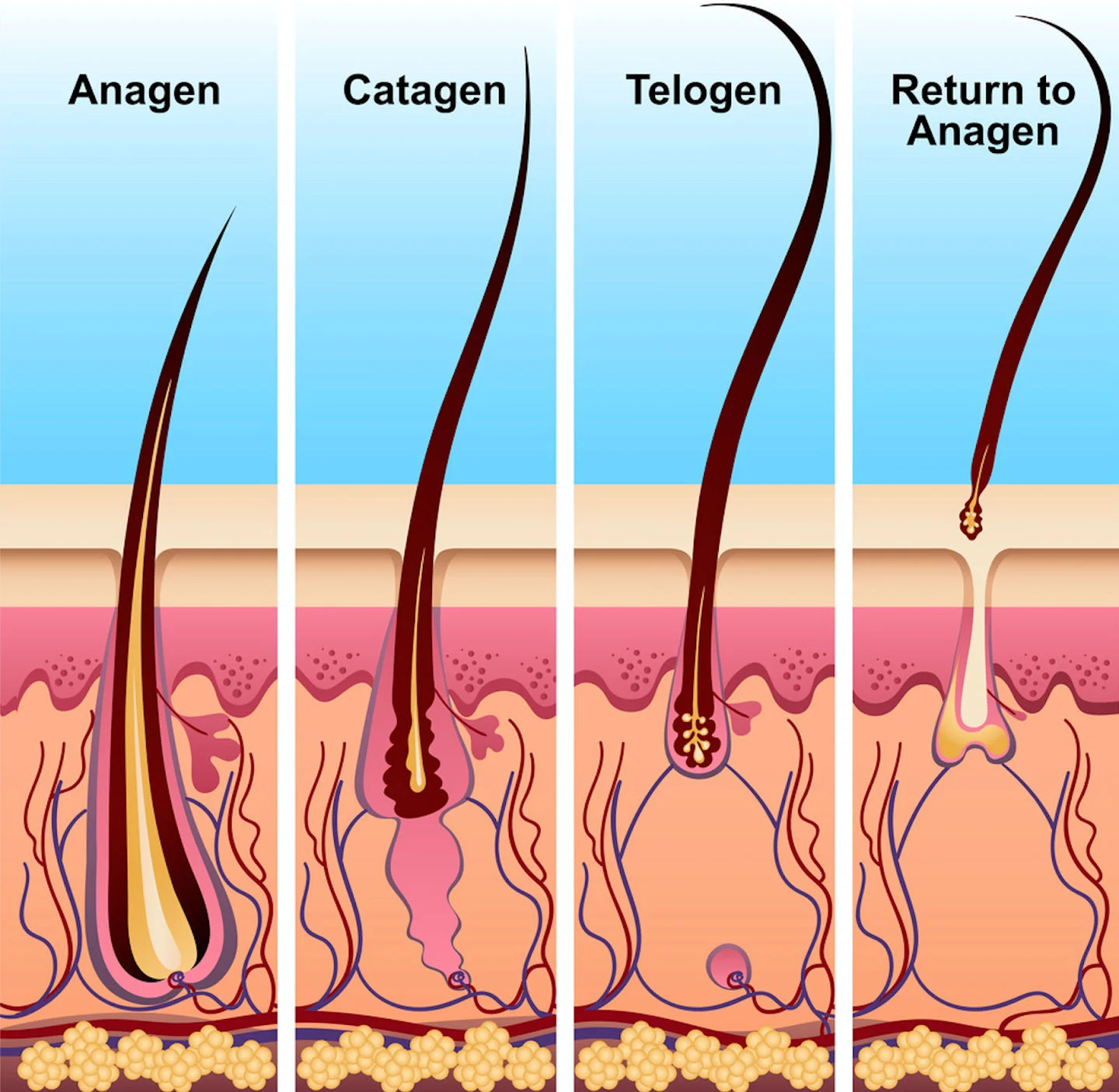HAIR LOSS AFTER BARIATRIC SURGERY
Hair loss following bariatric surgery is considered one of the most common side effects. Hair loss might occur 3-6 months post baariatric surgery. It seems to be scary and can cause a bit of stress and lack of your self-confidence. Is there anything that can be done about it? Let’s look at the whole hair growth cycle together.
THE HAIR GROWTH PROCESS
To understand hair loss after weight loss surgery, we must understand the cycle of hair growth. There are 4 main stages of hair growth.
- Anagen – growing phase. Longs in average 2-6 years. In this phase the hair is growing – about 1 cm every 28 days. Around 85% of our hair normally is in Anagen phase.
- Catagen – transition phase, longs 4-6 weeks. Cell division and hair growth gradually stop as the hair bulb detaches from the blood supply and the hair is held in place by the follicle.
- Telogen – resting phase, longs 2-3 months. The hair growth is complete and now the hair follicle prepares for a new cycle of growth. About 12-16% of our hair is in Telogen phase.
- Exogen – shedding phase. The old hair is pushed out. You may loose 50-150 hairs each day, this would be a normal shedding rate.

Cyclic hair growth is random, mosaic-like. Each hair follicle has its own individual control mechanism, which ensures its evolution and successive phases. This control mechanism is constantly coordinated and influenced by other factors – systemic factors – the hormonal system, cytokines and growth factors; and environmental factors – toxins, vitamin, nutrient and energy levels and deficiencies.
Diffuse hair loss is a disorder of hair cycling. Anything that interrupts a normal hair cycle can cause diffuse hair loss.
Both sexes are affected, but diffuse hair loss is more often diagnosed and observed in women.
Depending on which factors are most involved in the pathogenesis of hair loss and how the hair cycle changes, diffuse hair loss is divided into several types:
- Telogen Effluvium (excessive shedding of Telogen stage hair after some metabolic stress, hormonal changes, medication);
- Anagen hair loss or Anagen Effluvium (main causes might be an infection, drugs, toxins, radiation or an autoimmune disease);
- “Loose Anagen hairs” (this pathology results from hair root deformity and loss of attachment, is congenital and relatively rare).
WHY PEOPLE LOSE HAIR AFTER BARIATRIC SURGERY?
The hair loss after bariatric surgery would be the “Telogen Effluvium” type of hair loss. Certain hair strands stop growing and enter the Telogen phase sooner than expected and after 2-3 months these hair will be shedded.
The reason of this process can be stress to your body due to the surgery. The body has to live through big changes – the surgery itself and dramatic changes in nutrition – low calorie intake, potentially poor nutrition and deficiency of protein, iron and other supplements.
WHAT TO DO TO AVOID HAIR LOSS AFTER BARIATRIC SURGERY?
Good news – most bariatric patients refer full hair growth back over some time. What you can do during this time is to focus on your nutrition and supplement intake recommended by your surgical team and / or bariatric dietician.
- Hydration - water is essential for keeping cells, hair and skin hydrated and for eliminating waste (1.5 - 2 l of water daily).
- Macro nutrients – PROTEIN and FATTY ACIDS!!!
Protein is the most important macronutrient to bariatric patients! Having appropriate amounts of protein daily will provide the necessary amino acids to reduce the risk and intensity of hair loss after the weight loss surgery. Just to remind the proper amount of protein is 60 - 90g of protein daily. Build a habit to eat your protein first at each meal!
Implement fatty fish, nuts and seeds into your diet, or take an omega-3 supplement daily.
- Micronutrients (vitamins and minerals) – essential for healthy hair growth
Follow you take enough Zinc (15-40 mg daily), Vitamin B12, Vitamin D, Folic acid, Calcium (citrate), Folate, Biotin, Iron (50-100 mg daily).
️Ask for support from your GP or bariatric dietician. Your GP can support and help with proper supplement choices. Be patient, follow healthy eating advice and your hair will grow back in approx 1-1.5 years after your bariatric surgery.
- Avoid hairstyles that put additional stress on your scalp.
- It is not recommended to wash hair daily to avoid washing away Sebum - a natural hair conditioner.
Sebum is an oily, sticky secret produced by the sebaceous glands, which are located in the middle layers of the skin, near hair follicles. Sebum helps moisturize and protect the skin. The hair roots use sebum to transport nutrients and it is essential for supplying hair with nutrients.
- Scalp massage to improve blood circulation and hair growth.
Massage your scalp with fingertips slightly in small circles all over your scalp. Do this 1-2 times a day for 5-6 minutes.
🧡